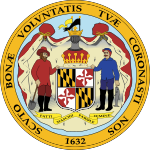| |||||||||||||||||
| Turnout | 72.84%[1] | ||||||||||||||||
|---|---|---|---|---|---|---|---|---|---|---|---|---|---|---|---|---|---|
| |||||||||||||||||
Alsobrooks: 40–50% 50–60% 60–70% 70–80% 80–90% >90% Hogan: 40–50% 50–60% 60–70% 70–80% 80–90% >90% | |||||||||||||||||
| |||||||||||||||||
| Elections in Maryland |
|---|
 |
|
|
The 2024 United States Senate election in Maryland was held on November 5, 2024, to elect a member of the United States Senate to represent the state of Maryland. Democratic Prince George's County executive Angela Alsobrooks defeated Republican former Governor Larry Hogan in the contest to succeed Democratic incumbent Ben Cardin, who did not seek a fourth term.[2] Alsobrooks is the first African American and second woman to represent Maryland in the Senate.[3]
After Cardin announced his retirement, Alsobrooks and Congressman David Trone emerged as the frontrunners in the Democratic primary. Although Trone heavily outspent Alsobrooks and led most public opinion polls, Alsobrooks won her party's nomination with 53% of the vote after taking a polling lead during the primary's final weeks. Hogan, who entered the race hours before the filing deadline, quickly emerged as the Republican frontrunner and won his party's nomination with 64% of the vote against former state delegate Robin Ficker.
Despite Maryland's status as a reliably Democratic state, the election was considered more competitive than usual due to Hogan's popularity, reputation as a moderate Republican, and opposition to Donald Trump.[4] Alsobrooks was still considered the favorite to win, due to Maryland's heavy Democratic lean and the concurrent presidential election.[5]
Hogan was the strongest nominee of either party in the 2024 cycle, running 17 points ahead of Trump and was one of several Republican Senate overperformances.[6] He flipped two counties won by Kamala Harris in the presidential contest—Anne Arundel and Frederick; and became the first Republican to exceed one million votes in a Maryland Senate election. Despite this, Hogan could not overcome Alsobrooks' margins in the Washington–Baltimore metropolitan area, marking the closest Senate race in Maryland since 2006.[7]
Republicans have not won a Senate election in Maryland since 1980.
- ^ "Official 2024 Presidential General Election turnout" (PDF). Maryland State Board of Elections. Retrieved December 5, 2024.
- ^ Cite error: The named reference
Cardinwas invoked but never defined (see the help page). - ^ Sears, Bryan P.; Ford, William J. (November 6, 2024). "Alsobrooks makes history in Senate race, as Hogan cannot repeat his magic". Maryland Matters. Retrieved November 7, 2024.
- ^ "The 10 Senate seats most likely to flip in 2024". CNN. July 20, 2024.
- ^ McCall, Max; Jain, Lakshya (February 11, 2024). "Larry Hogan Faces An Impossible Challenge". Split Ticket. Retrieved February 12, 2024.
- ^ Rakich, Nathaniel (January 10, 2025). "Who were the strongest Senate and House candidates of 2024?". ABC News. Retrieved January 10, 2025.
- ^ "Larry Hogan's winning streak comes to an end". The Baltimore Sun. November 6, 2024. Retrieved November 13, 2024.






